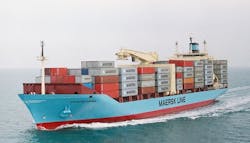Ports of Los Angeles and Shanghai join cargo giants in launching Green Shipping Corridor
A group including some of the biggest cargo shipping lines and the Ports of Los Angeles and Shanghai will partner to create a transition to zero carbon-fueled vessels by 2030.
The Green Shipping Corridor plan will move in phases. The aim is to reduce cargo transportation-related greenhouse gas emissions throughout the 2020s on one of the world’s busiest container shipping routes.
The partnership will work with key maritime stakeholders to achieve the goals by devising a “Green Shipping Corridor Implementation Plan” by the end of this year. The plan will include deliverable, milestones and the roles for the partnership.
Participating partners in the partnership include A.P. Moller – Maersk, CMA CGM, Shanghai International Ports Group (SIPG), COSCO Shipping Lines, the Aspen Institute’s Shipping Decarbonization Initiative, facilitators of Cargo Owners for Zero Emission Vessels (coZEV) and the Maritime Technology Cooperation Centre – Asia.
The decarbonization goals for this partnership include the transition to low, ultra-low, and zero-carbon fuelled ships, the development of best management practices to reduce emissions and decreasing supply chain emissions from port operations.
“International collaboration is essential to decarbonize global supply chains,” Port of Los Angeles’ Executive Director Gene Seroka said. “We look forward to partnering with the Shanghai Municipal Transportation Commission, the Shanghai International Port Group, leading shipping lines and major cargo owners to reduce greenhouse gas emissions in the maritime supply chain. It’s time to get started on this important work.”
C40 Cities’ Executive Director Mark Watts added, “By convening international coalitions of the willing and creating a scalable and replicable model for other cities to follow, we hope this ground-breaking green shipping corridor initiative will catalyze action on a global scale.”
